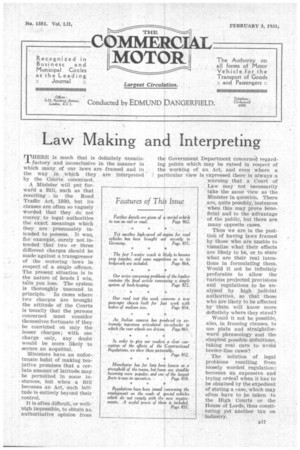Law Making and Interpreting
Page 35

If you've noticed an error in this article please click here to report it so we can fix it.
THERE is much that is definitely unsatis7 factory and inconclusive in the manner in which many of our laws are framed ltud in the way in which they are interpreted by the Courts concerned.
A Minister will put forwaid a Bill, such as that. resulting in the Road. , Traffic Act, 1930, but its clauses are often so vaguely worded that they do_ not convey to legal authorities the exact meanings which they are • presumably intended to possess. It was, for example, • surely not intended' that two or three different charges should be made against a transgressor of the , motoring --laws in respect of, a single offence. The present situation is in the nature of heads I win, tails you lose. The system Is thoroughly unsound in principle. In cases where two charges are• brought the attitude of the Courts is usually that the persons concerned must .consider themselves fortunate if they be convicted on only the lesser charges ; with one charge only, any doubt would be more likely to secure an acquittal.
Ministers have . an unfortunate habit of making tentative promises that a certain amount of latitude may be permitted in some instances, but when . a Bill becomes an Act, • such latitude is entirely beyond their: control. .
It is often difficult, or well-; nigh impossible, to obtain an authoritative opinion from the Government Department concerned regarding points which may be raised in respect of the working of an Act, and even where a ) particular view is expressed there is always a warning that a Court of • Law may not necessarily take the same View as the Minister in question. There are, quite possibly, :instances when this may prove beneficial and to the advantage • of . the public, but there are many opposite cases.
Thus we are in the position of having laws framed by these who are unable to visualize what their effects are likely to be, or. to state what are their real intentions in formulating them. Would it not be infinitely preferable to allow the various projected provisions and regulations to be analySed .. by high judicial authorities, so that those who are likely to be affected by "them will know more definitely where they stand?
Would it not be possible, also, in framing clauses, to use plain and straightforward phraseology and the simplest possible definitions, taking real care to avoid border-line cases?
. The solution of legal problems resulting from loosely worded regulation beconies an ,expensive and trying ordeal When it has to be obtained by the expedient of stating a case, which may often have to be taken to the High Courts or the Ilotiser Of tordS; thus constituting yet: another tax on Industry.




































































































